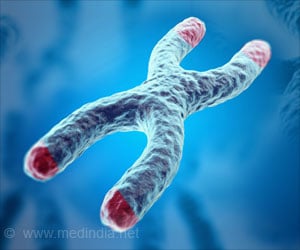-
Shorter telomeres are linked to increased disease risk and shorter lifespans - Extremely Longer telomeres might delay aging but can increase cancer risk
- Healthy lifestyle choices can influence telomere length and promote longevity
Telomeres, the protective caps at the end of our chromosomes, have been a focal point in research on aging and longevity. But are they truly the secret to living longer, healthier lives?
Telomeres are stretches of repetitive DNA and proteins found at the ends of our chromosomes. Their main role is to protect our DNA from damage during cell division. Each time a cell divides, these telomeres shorten slightly. When they become too short, the cell can no longer divide and eventually dies or becomes senescent (inactive) (1✔ ✔Trusted Source
Human telomere length is chromosome end-specific and conserved across individuals
).
Advertisement
Telomeres and Aging: The Connection
Telomere length is often considered a marker of biological age. Shorter telomeres have been linked to several age related diseases, such as osteoarthritis, atherosclerosis, and even cancer. This has led to the theory that maintaining longer telomeres could help prolong life and reduce the risk of these diseases.
- Shorter Telomeres: Associated with increased disease risk and shorter lifespans.
- Longer Telomeres: Believed to allow cells to divide more, potentially leading to a longer life.
While the idea of longer telomeres sounds promising, recent research suggests it’s not that simple. Studies have shown that while longer telomeres might delay aging, they could also increase the risk of certain cancers. This is because cells with longer telomeres might accumulate mutations over time, leading to the development of tumors (2✔ ✔Trusted Source
Familial Clonal Hematopoiesis in a Long Telomere Syndrome
).
Extremely longer telomeres could increase the chance of cancer due to prolonged cell division.Telomere length is not a straightforward predictor of longevity or health.
Advertisement
Factors Influencing Telomere Length
Recent research suggests that telomere length might be determined at birth and could vary between chromosomes. This means that while lifestyle factors can influence telomere shortening, the baseline length may be something we are born with.
Telomere length may be largely predetermined by genetics. While you can’t change your genetic telomere length, lifestyle choices can still influence how quickly they shorten.
A diet rich in fruits, vegetables, and whole grains, such as the Mediterranean diet, is associated with longer telomeres. Physical activity, particularly moderate exercise, has been linked to maintaining telomere length. Smoking accelerates telomere shortening, leading to faster biological aging. Chronic stress can shorten telomeres, so managing stress is crucial for longevity.
Advertisement
The Bigger Picture: Healthy Aging Beyond Telomeres
Focusing solely on telomeres might be too narrow an approach to healthy aging. Other factors, such as genetics, environmental influences, and overall lifestyle, play critical roles in how we age (3✔ ✔Trusted Source
What Do We Know About Healthy Aging?
).
Tips for Healthy Aging:
- Aim for at least 150 minutes of moderate exercise per week.
- Follow a balanced diet rich in antioxidants and anti inflammatory foods.
- Strive for 79 hours of sleep each night to support overall health.
- Quit smoking to reduce the risk of premature aging and diseases.
- Practice relaxation techniques, like meditation, to keep stress levels in check.
- Stay on top of health screenings and medical checkups.
- Strong social ties can contribute to a longer, healthier life.
While telomeres play a role in the aging process, they are just one piece of the puzzle. The best approach to living a long and healthy life involves a combination of a balanced diet, regular physical activity, sufficient sleep, stress management, and regular health checkups. These lifestyle factors are within our control and can help promote healthy aging, regardless of our telomere length.
References:
- Human telomere length is chromosome end–specific and conserved across individuals
– (https://www.science.org/doi/10.1126/science.ado0431) - Familial Clonal Hematopoiesis in a Long Telomere Syndrome
– (https://www.nejm.org/doi/full/10.1056/NEJMoa2300503) - What Do We Know About Healthy Aging? – (https://www.nia.nih.gov/health/healthy-aging/what-do-we-know-about-healthy-aging)
Source-Medindia



